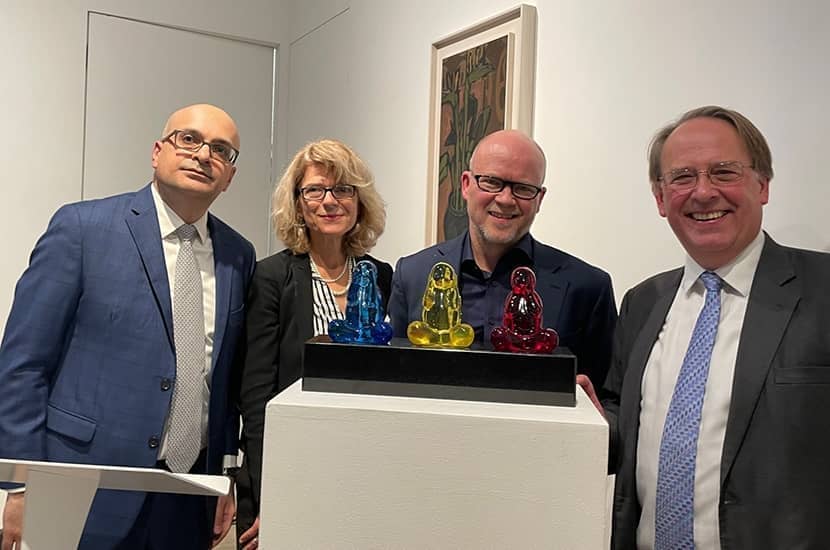Something rather unusual happened to me a few weeks ago: I was shortlisted for a prize. Not the GQ Men of the Year — shock! — but the Contrarian Prize. This is an award given to people who’ve exhibited ‘independence, courage and sacrifice’ in British public life. Previous winners include the headmistress Katharine Birbalsingh, the economist Patrick Minford and the human rights lawyer Clive Stafford Smith. Quite distinguished company, in other words.
On 11 November I was invited along to the Bernard Jacobson Gallery in St James’s by Ali Miraj, the creator of the prize, for the award ceremony. Naturally, the first thing I did was look around to see which of the other people on the shortlist were there. I’m not saying this is one of those prizes that you automatically win if you’re the only nominee to turn up, but the fact that two of the four shortlisted heroes hadn’t bothered to come was surely a good sign.
I had debated whether to write an acceptance speech just in case but my son Freddie forbade it
I had debated whether to write an acceptance speech beforehand just in case, but my 14-year-old son, Freddie, expressly forbade it — ‘You definitely won’t win if you do that’ — and I took his advice. I dare say that’s a common superstition among award nominees. It would explain why Oscar acceptance speeches are usually so bad. Then again, I didn’t want to say something off the cuff that would come back to bite me. That was Kingsley Amis’s fate when he unexpectedly won the Booker Prize for The Old Devils in 1986. During his acceptance speech he said that he had previously thought of the Booker as a rather trivial, showbizzy sort of caper, but now considered it a very serious, reliable indication of literary merit.
He was rewarded for this self-deprecating joke by a BBC presenter, doing a round-up of the year’s events, noting that Amis had won the illustrious prize in spite of having previously disparaged it. ‘Memo to writers and others,’ wrote Amis about this incident. ‘Never make a joke against yourself that some little bastard can turn into a piece of shit and send your way.’
The speeches leading up to the prize-giving were long, and a wag standing behind me, noting my agitation, said this was intentional. ‘It’s like The X Factor,’ he whispered. ‘They’re deliberately drawing it out to prolong the suspense.’
One of the judges was Vicky Pryce, the former joint head of the UK’s Government Economic Service and a prominent Remain campaigner, and I felt sure that I couldn’t possibly win if she had any say in the matter. But in her speech she began by saying that this year’s winner wasn’t the first choice of all the judges, which I took to be a way of distancing herself from the decision — another good sign!
The moment finally arrived at about 8.15 p.m., with the journalist Michael Crick bounding up to present the prize. After lavishing the nominees with praise, he slowly opened the envelope, looked at the name, glanced up at the audience, and then paused in the manner of Simon Cowell. Then, blow me, he read out my name. As the audience dutifully applauded, I made my way to the front and suddenly had to suppress an urge to make a speech flamboyantly rejecting the prize. After all, isn’t that what a genuine contrarian would do? The same gag was made by the Telegraph columnist Michael Deacon a few days later.
‘A true contrarian would storm up on to the stage, fling the award out of the nearest window in disgust, and then launch into an impassioned denunciation of the ceremony, the organisers, the attendees, and contrarianism itself,’ he wrote. ‘He would declare that contrarianism is childish, political correctness is a force for good, freedom of speech is overrated, the liberal establishment is wonderful, people who bill themselves as contrarians are chancers and blowhards, their admirers are mugs, the ceremony’s organisers are juvenile nitwits, and the tawdry trinket they’ve gathered here to bestow on him is utterly worthless. At which point, the organisers should burst into a thunderous standing ovation, and upgrade his prize to a lifetime achievement award.’
Of course, I did no such thing. I was enormously grateful, having never won such a prize before. It was in recognition of the work I’ve done in helping to establish the Free Speech Union and I accepted it on behalf of the staff and the directors, as well as all the people who’ve been good enough to support the organisation. On the way out, Caroline asked if I had something in my eye. I couldn’t possibly comment.







Comments